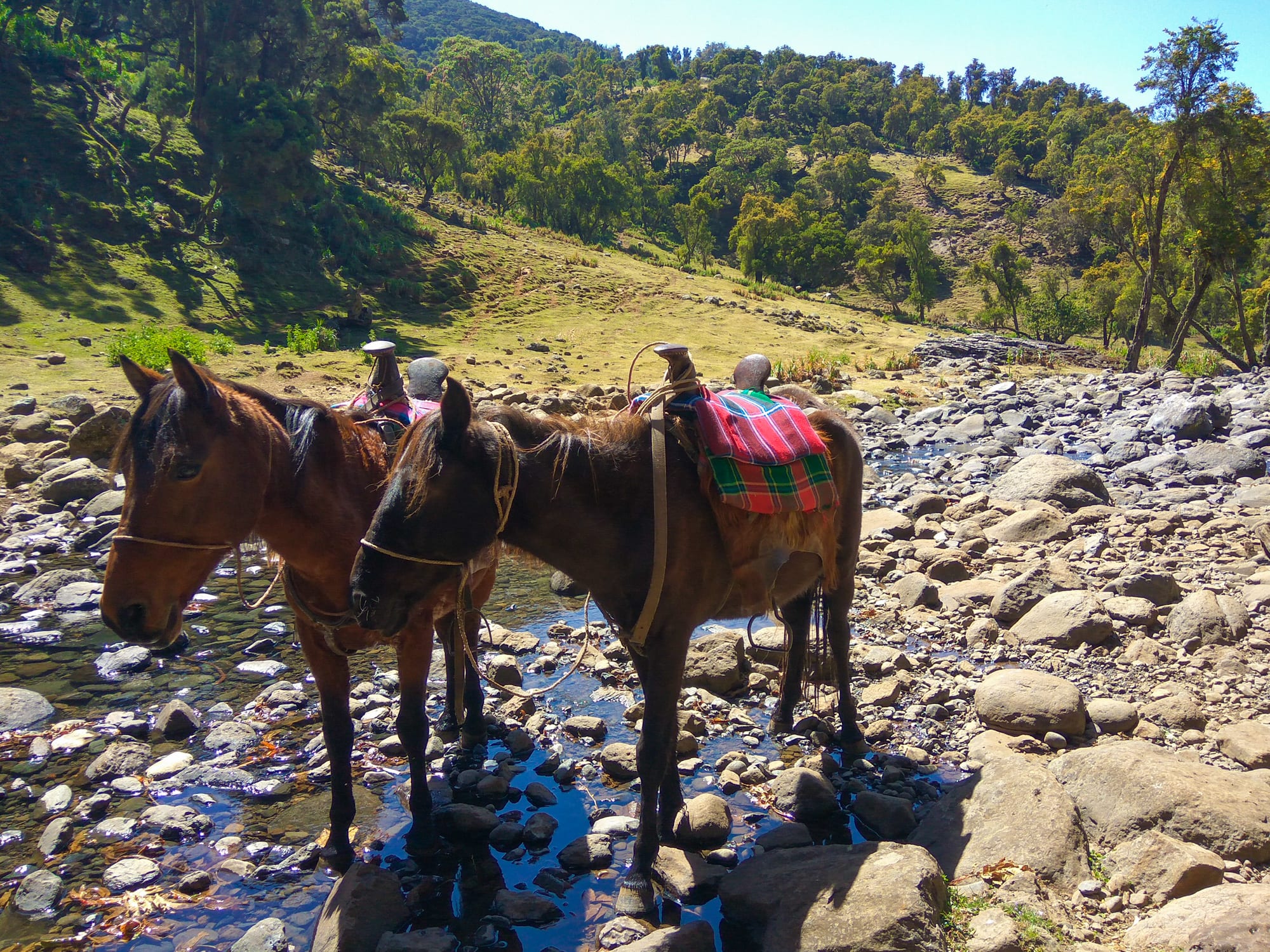Trail riding in the Bale Mountains was the adventure of a life time: horse handlers who run as fast as galloping horses, forests full of cute monkeys and fields packed with fleas. In this sixth part of the seven-part-long story we give an account of the traditional huts we visited and thoughts on a tipping issue. You may read about our adventure from the beginning here.

Day 5
Riding
In the morning, the first 10 minutes of riding revealed that our horses weren’t really motivated to move. On the village meadow, there was a chance to go fast but the best we could get from our horses was a couple of minutes of trotting. Nostalgically, I thought back to my fast and obedient horse from the first day.
The horse handler made up for the horses: he was walking and sometimes running behind the horses for the entire day, whipping the horses, showing us the direction, while the guide and the cook slowly followed behind. He provided us with new whips from the fences and the bushes around when ours broke. Once he climbed a tall tree to get good flexible whips for us – in spite of our protests.
However, having arrived at the next camp, we observed our horses running eagerly and fast – maybe because they knew that they were going back home or because they were hit with a thick stick way harder than they were whipped by us.

Tipping Until then, we hadn´t tipped the handlers. On the first day, Balti was really not happy with his horse and riding gear as his short stirrups kept falling apart. He claimed, the world works like this: You give tips only if you are satisfied as tipping for a bad service would encourage the handlers to leave everything the way it is (That is with a great need of improvement). We thought it was just a one-time occurrence and were ready to tip the handlers the following day.
But then my riding gear was so bad, we were generally unhappy with the slow pace we moved forward because our guide preferred to walk and the tipping was omitted the second day as well.
As on our fourth day, the overall condition of the horses and the gear was worse than ever before, we didn´t tip the handlers either. Today we finally realized that the problems with the gear and the horses were not an exception but it was the way it was meant to be. The room for improvement existed only in our heads, but not in the Dodola reality. Our handler who also took on the job of the guide that day certainly deserved some extra money, we thought.
A Hut That night was our last evening spent together by a campfire and hence a good chance to overcome any reservations. The guide and the cook made a step forward to be on more friendly terms. First of all, they invited us to try the leftovers of the cabbage dish they had cooked for themselves – it was really good, the cook did a really great job. Then they suggested that we should take a look at the hut they were going to sleep in that night. Unlike our hut that was a product of the modern unappealing design, (square form, a corrugated metal roof), theirs was a traditional clay hut. It was small, round and its roof was covered with thatched hay. Inside, there was a fireplace and benches made of clay that also served as beds. Apparently, the whole family is supposed to share one room. When a family gets too big, another hut is to be built.



The Campsite Our campsite was lovely. Its location was chosen brilliantly - once again. We could enjoy a great view down onto the valley. There was a small stream rushing past. By the stream, where we had spent the last couple of sunny hours of the day. We made another attempt to wash us but it demanded a big deal of observation and planning. A few locals were passing through the valley and we had a feeling that it would be very inappropriate to strip down to our bathing suits. At the sight of us, the locals often found it more interesting to delay and observe us rather than continue to go where they were going.
We hope you found this article insightful. Find out more about trekking in the Bale Mountains in Ethiopia in the next post.
it is you who keeps our site running and helps us grow and bring you more stories from our trips and the local people we encounter. We believe that telling these stories brings the world closer together and is hence a way to make a positive change! Please support us with a small donation on the kofi platform. Even a small contribution makes a big difference!
